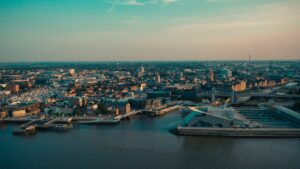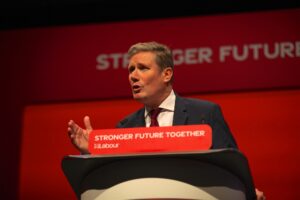 There is widespread recognition that we are in a dreadful mess, economically, socially and ecologically. These interlinked crises affect us all in various ways, whether in urban or rural settings in the UK and they are also a major risk for those yet to be born.
There is widespread recognition that we are in a dreadful mess, economically, socially and ecologically. These interlinked crises affect us all in various ways, whether in urban or rural settings in the UK and they are also a major risk for those yet to be born.
Yet despite many good analyses of the problem, exciting local initiatives and good policy proposals, there is still a lack of a convincing narrative that links all this together in a way that can help crystallise a progressive coalition for economic, social and ecological justice we so badly need.
The Manchester collective, Steady State Manchester, has been working for nearly three years on the idea of a post-growth economy. It has focussed on its implications at the municipal and regional levels, emphasising re-localisation (in the context of ‘globalisation gone mad’), re-distribution and equality, the money-debt-credit-investment system, and how to assess the wellbeing of the community without reliance on the crude economic measures of GDP and GVA growth.
Now we have published The Viable Economy, a pamphlet for everyone concerned about the dangers we face from the current unviable economic system and who would like to explore an approach that integrates economic, social and ecological wellbeing.
It suggests a path to a resilient, more localised, stable economy that delivers what we all need while ensuring more equity and harmony in our own area and throughout the world. Drawing on the values of stewardship, justice, conviviality, solidarity, co-operation, equality and respect, it argues that we can decide on rather than follow economic rules, tread lightly on the earth and protect and restore those systems that make life possible.
Its claim to present a vision of an economy that works for all is a strong one, so while we are confident about the central principles we do see this as work in progress, and welcome constructively critical feedback so we can improve it. And for this reason, while it sets out a variety of policy ideas, it does not present a grand plan: instead we want to work in partnership, and in parallel, with a loose alliance of actors who can make this happen, working out the detail, identifying the barriers to overcome, and deepening the overall understanding of what a viable economy (and society) actually means.
So what is the viable economy?
The viable economy is not something we have just dreamed up but a way of bringing together a number of ideas and practice into a framework.
An economy that works:
- is resilient in the face of bubbles, crashes, supply chain interruptions and the whim of national governments.
- delivers (and measures) what we need; where some sectors will grow (e.g. renewable energy) and some must shrink (e.g. fossil fuels, financial speculation, armaments).
- is one in which more money stays local and there is local control over savings and investment.
- where investment comes from within rather than as profit-seeking from external investors.
An economy which is socially viable:
- includes everyone, that uses everyone’s energies and talents to the full and is based on nurturing human and social capital.
- builds equality, solidarity and co-operation among people, here and elsewhere.
- does not exploit the majority world while keeping open channels for communication and learning globally.
- has more space for non-commercial transactions (including care of children , adults, neighbourhoods and exchanging services and skills: the collaborative or solidarity economy).
An economy which is ecologically viable:
- radically reduces both the use of limited resources and the emission of pollutants, including greenhouse gases: a one-planet economy.
- is based on production and consumption for need: a frugal abundance.
- has more security for us all because the environment is protected from further destruction.
- is resilient to climactic and other ecological shocks.
- is an economy that practices stewardship of the natural world that we depend on.
The pamphlet draws on ground-breaking thinking of recent years from a variety of fields and movements, including new economics, social justice, social ecology, trade justice and alternative/post development, bringing them together because, as ecology teaches us, everything is interconnected.
It covers eleven critical areas: growth; resilience; space; democracy and ownership; investment, money, credit and debt; distribution and equality; work and income; environment; consumerism; living well and its measurement and population and migration. For each area there is an outline of the current problems, the viable alternative and some viable policy ideas.
The themes that constantly run through these 11 areas are equity, localisation, money and measurement. We argue that greater equity is needed globally as well as locally and economically as well as socially. We recognise that greater equity is needed wherever there are preventable gaps if everyone is to live well and the economy is to be viable.
We noted the dangers of being too prescriptive in a visionary piece of work such as this. But, bearing in mind that risk, here are some priority areas to give a flavour of how we can move further along the path to viable economy, making that road as we walk along it.
- Increase equality: since those on high incomes lead more carbon intense lifestyles – spending their surplus on luxury goods, travel and so on; and because in a post-growth economy, inequalities can no longer be masked by the illusion that the cake is growing. Do this by pressurising all public services to go for Living Wage accreditation, exercising leverage on their wider economic footprint via their supply chains.
- Relocalise the economy: using a guiding principle of subsidiarity – that which can be produced locally should be. Start with things like food, energy and textiles, building what I call the replacement economy, scaling up the many good local initiatives already in place.
- Tackle the nexus of credit, debt and investment: so that the wealth of the local economy is invested for local prosperity rather than profit-seeking globally – e.g. via a regional green development bank, or, given the appetite for city regional economic sovereignty, through a Greater Manchester Pound, or equivalent (on the model of other parallel currencies like the Bristol Pound, creating money that can be spent into the local economy).
- Stop chasing inward investment and building trophy projects, hoping for crumbs off the BRICs table, but instead focus on the real local economy.
- Tackle the culture of consumption: not by blaming citizens for their consumption patterns, but by building a culture that has real alternatives to the assertion of fragile identity through largely passive consumption. This requires the creation and defense of non-commercial public spaces, and the active promotion of participation in cultural production as a right.
- The Viable Economy is available as a download and there is a launch event in Manchester on 9 December.

















Leave a Reply